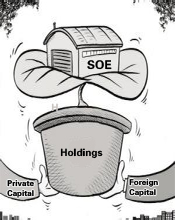CHENG ENFU and DONG YUKUN:Public capital still key in mixed-ownership

China is actively developing a mixed-ownership economy dominated by public capital.
In 2014, economic scholars held extensive discussion on the theory and policy of “actively developing a mixed ownership economy” pushed forward in the decision on “major issues concerning comprehensively deepening reforms” approved at the third Plenary Session of the 18th Communist Party of China Central Committee.
The decision on “major issues concerning comprehensively deepening reforms” held that diversified ownership integrated by State capital, collective capital and private capital is the prime method for materializing the basic economic system. It also asserted that China’s economic system is one with public ownership serving as its main body but allowing for the development of all types of ownership. This indicates that public capital must be the main body of China’s mixed-ownership economy.
Public capital as main body
A mixed-ownership economy dominated by public capital ensures properties of socialism. It is an inevitable requirement of perfecting the socialist market economy, while also an important guarantee for national economic security. Amid deepening economic globalization, China faces the severe situation of economic security in the context of Western multinational capital globalization. A large amount of foreign capital occupies the position of dominance and monopoly in China’s important industrial fields.
Given the volatile situation facing the domestic market, it is large State-owned enterprises (SOEs) that serve as pillars in China’s economic security. Western multinational companies occupy most profitable fields SOEs have withdrawn from, and private enterprises only receive meager profits by comparison. As a result, foreigners have accumulated wealth that belongs to the Chinese people.
Control, influence of public capital
Firstly, with the proportion of China’s State-owned economy becoming increasingly low and even lower than some capitalist counties, it is urgently needed to push forward the mixed-ownership economy with State-owned capital controlling shares by actively controlling non-public sector stocks.
Public capital is in a dominant position to important industries and key fields concerning national security and lifelines of the national economy, which is normal worldwide. Governments around the world own strong management rights in special realms such as defense, water, energy and transportation, and China is no exception. Public capital must have absolute control in these fields to ensure China’s national security and economic independence.
Secondly, public capital may adopt multiple ways to attract non-public capital to develop the mixed-ownership economy, under the premise of controlling enterprises of public policy. For example, markets such as health care and the social pension have great potential. They can be organized by the government, dominated by public capital and attract non-public capital to accelerate their development through the mixed-ownership economy.
Thirdly, developing diversified ownership means different types of capital sharing or controlling stocks between each other. Many Western countries actively advocate employees holding shares in non-public enterprises, carrying out the profit-sharing system of “mutual benefits of labor and capital.” Socialism with Chinese characteristics should vigorously push forward the socialist reform and let the masses share achievements in participating in the reform of the mixed-ownership economy.
Fourthly, lack of funding is not a problem for existing large SOEs. We should start reform by exploring ways of enterprise management and operation. Reform of large and medium-sized SOEs aims to promote SOEs and enhance vitality, influence and competitiveness of public capital, serving national development strategy and the national economy and people’s livelihoods.
SOEs are important pillars of the national economy. We should prevent lopsided development and reform of the mixed-ownership economy and avoid faults in enterprise reform.
The authors are both from the Academic Division of Marxist Studies at the Chinese Academy of Social Sciences.
